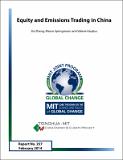| dc.contributor.author | Zhang, D. | |
| dc.contributor.author | Springmann, M. | |
| dc.contributor.author | Karplus, V.J. | |
| dc.date.accessioned | 2014-08-07T20:33:57Z | |
| dc.date.available | 2014-08-07T20:33:57Z | |
| dc.date.issued | 2014-02 | |
| dc.identifier.uri | http://hdl.handle.net/1721.1/88604 | |
| dc.description.abstract | China has embarked on an ambitious pathway for establishing a national carbon market in the next five to ten years. In this study, we analyze the distributional aspects of a Chinese emissions-trading scheme from ethical, economic, and stated-preference perspectives. We focus on the role of emissions permit allocation and first show how specific equity principles can be incorporated into the design of potential allocation schemes. We then assess the economic and distributional impacts of those allocation schemes using a computable general equilibrium model with regional detail for the Chinese economy. Finally, we conduct a survey among Chinese climate-policy experts on the basis of the simulated model impacts. The survey participants indicate a relative preference for allocation schemes that put less emissions-reduction burden on the western provinces, a medium burden on the central provinces, and a high burden on the eastern provinces. Most participants show strong support for allocating emissions permits based on consumption-based emissions responsibilities. | en_US |
| dc.language.iso | en_US | en_US |
| dc.publisher | MIT Joint Program on the Science and Policy of Global Change | en_US |
| dc.relation.ispartofseries | MIT Joint Program Report Series;;Report 257 | |
| dc.title | Equity and Emissions Trading in China | en_US |
| dc.type | Technical Report | en_US |
| dc.identifier.citation | Report 257 | en_US |

